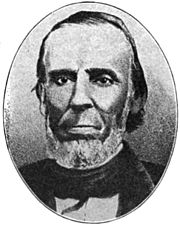Jesse Quinn Thornton facts for kids
Quick facts for kids
Jesse Quinn Thornton
|
|
|---|---|
 |
|
| 6th Supreme Judge of the Provisional Government of Oregon | |
| In office February 20, 1847 – November 9, 1847 |
|
| Appointed by | George Abernethy |
| Preceded by | Peter Hardeman Burnett |
| Succeeded by | Columbia Lancaster |
| Member of the Oregon House of Representatives | |
| In office 1864–1865 |
|
| Constituency | Benton County |
| Personal details | |
| Born | August 24, 1810 Point Pleasant, Virginia |
| Died | February 5, 1888 Salem, Oregon |
| Political party | Republican |
| Spouse | Nancy M. Logue |
Jesse Quinn Thornton (born 1810, died 1888) was an important American pioneer in Oregon. He was involved in politics, law, and education. He served as a top judge for Oregon's early government. He also helped Oregon become an official U.S. territory. Later, he worked in the Oregon Legislature and even wrote the state's motto.
Contents
Jesse Quinn Thornton's Life
Early Life and Education
Jesse Quinn Thornton was born on August 24, 1810. His birthplace was near Point Pleasant, Virginia. This area is now part of West Virginia. He grew up in Champaign County, Ohio.
Jesse studied law in London for almost three years. When he came back to the United States, he continued to study law in Virginia. He became a lawyer in 1833. He also attended lectures at the University of Virginia.
In 1835, Thornton moved to Palmyra, Missouri. There, he worked as a lawyer and also edited a newspaper. On February 8, 1838, he married Agnes (Nancy) M. Huston Logue. She was a teacher.
Thornton was against slavery. This caused problems for him in Missouri, which supported slavery. So, in 1841, he and his wife moved to Quincy, Illinois. He knew important people like newspaper editor Horace Greeley and senators Thomas Hart Benton and Stephen A. Douglas.
Journey to Oregon
The Thorntons decided to move to Oregon, hoping it would improve their health. They left Illinois on April 18, 1846. After a short stop in Independence, Missouri, they joined a wagon train on May 15. This group included travelers going to both Oregon and California. Some of the California-bound travelers later became part of the famous Donner Party.
On June 1, Thornton and his partner had a disagreement about their wagon. The next day, the Oregon-bound wagons were asked to leave the main group.
When they reached Fort Hall, near what is now Pocatello, Idaho, Thornton's group met Jesse Applegate. Applegate and others were surveying a new route to the Willamette Valley. This new path would help pioneers avoid the difficult Columbia River.
On August 9, 1846, Thornton's group started on the California Trail. They followed it until they reached central Nevada. From there, the new Applegate Trail went northwest. This trail entered Oregon from the south.
The new road was not easy for wagons. The first group had to make many improvements, which slowed them down. Some pioneers, including the Thorntons, had to leave their wagons and belongings behind. On November 30, 1846, Thornton arrived at Salt Creek in Yamhill District. Soon after, he wrote a letter to the Oregon Spectator newspaper. He asked settlers to send help to the Umpqua Valley for the pioneers who were still on the trail.
Political Career in Oregon
On February 20, 1847, Governor George Abernethy appointed Thornton as the Supreme Judge. This was for the Provisional Government of Oregon, which was Oregon's early government. He served until November 9, 1847.
He resigned because Governor Abernethy asked him to go to Washington, D.C. His mission was to ask the U.S. Congress to make Oregon an official U.S. territory.
Thornton sailed east on a ship called the Whiton. He carried a formal request from the Provisional Legislature of Oregon. During a month-long stop in San Francisco, he met survivors of the Donner Party. They told him about their terrible journey to California.
Thornton arrived in Boston in May 1848. He spent the summer in the East. The Oregon Territory was officially created on August 14, 1848. During his travels, Thornton wrote about his journey. This book was published in early 1849 as Oregon and California in 1848. After his work in Washington, D.C., Thornton returned to Oregon. He practiced law in the Willamette Valley.
Oregon's Motto
Thornton created the motto "She flies with her own wings." In Latin, this is Alis volat propriis. This phrase became the motto of Oregon Territory. It was added to the territorial seal on January 18, 1854. This happened because of a law passed by the Oregon Territorial Legislature.
In 1864 and 1865, Thornton returned to politics. He served in the Oregon House of Representatives. He represented Benton County as a Republican.
From 1872 until 1888, he was on the Board of Trustees for Willamette University in Salem.
Later Life and Legacy
Jesse Quinn Thornton died in Salem on February 5, 1888. He was buried at Lee Mission Cemetery. His wife, Nancy, died the next year and is buried beside him. They did not have their own children but had an adopted daughter.
Works
- Oregon and California in 1848. This book has two volumes. It was published in New York by Harper and Brothers in 1849. Volume 1 | Volume 2
 | Valerie Thomas |
 | Frederick McKinley Jones |
 | George Edward Alcorn Jr. |
 | Thomas Mensah |

